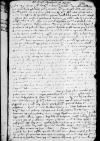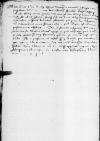Letter #1775
[Ioannes DANTISCUS] to Dietrich von RHEDENLöbau (Lubawa), 1537-11-16
English register: Dantiscus expects that Rheden received his letter, sent on October 1 from Grudziądz, together with enclosed documents concerning Dantiscus and Tiedemann Giese. He now encloses the next part of the documentation concerning the papal provision for himself and Giese, and also concerning his resignation from the Warmia canonry and prebend in favor of Fabian Wojanowski. He sends more copies of the king’s letters to the pope and the Cardinal Protector, and also new letters to them from the king, together with copies for Rheden, concerning a reduction in the annates. He notes that this fee is particularly unjustly high (700 ducats) for the Chełmno bishop, compared to the annual income from his bishopric, as the income does not even reach 700 ducats in cash. Though Dantiscus was forced to pay this amount seven years ago, because the pope needed money for the war with Florence, today there are no grounds for Giese to be charged such a large sum. Dantiscus informs Rheden that he has written a separate letter on this matter to the Cardinal Protector. He encloses the letter together with a copy for Rheden. In a letter from Giese, Rheden will receive detailed information on the annates of Warmia bishop Fabian (Luzjański). Luzjański paid about 750 ducats. Dantiscus thinks this amount is excessive as well and asks Rheden to try to get it reduced. Dantiscus asks Rheden to make all of his and Giese’s payments through the Fuggers’ bank. The Fuggers will also pay his remuneration – 30 ducats from Dantiscus and 20 from Giese. Rheden will find more detailed instructions in Tiedemann Giese’s letter which has already been posted. Dantiscus asks Rheden to send Giese’s provision bulla to Cracow as soon as possible, so that the king can issue a letter to the people of the diocese and install Giese in his new office. Dantiscus is very grateful to Rheden for promptly sending the breve giving him the right to administrate the Warmia diocese (before obtaining the papal provision). He has also read Rheden’s letter to Giese of September 23 and was happy at the obvious goodwill towards himself that it contained. He thanks him for the news about the emperor, Turkey and Venice. He sees no need to instruct Rheden as to the document of resignation (from the Warmia canonry in favor of Wojanowski). If any doubts arise, Rheden should turn to Dantiscus’ brother Bernard who is in Cracow.
Manuscript sources:
Prints:
| ||||||||||||||||
Text & apparatus & commentary Plain text Text & commentary Text & apparatus
Venerabilis Domine, amice et frater carissime ac honoran(de) or honoran(dissime)⌈honoran(de)honoran(de) or honoran(dissime)⌉. Salutem et omnem felicitatem.
cf.
Quod vero litterae meae aliquot diebus sint recentiores quam
Cum Dominatio Vestra bullas omnes pro
Operam et diligentiam Dominationis Vestrae in mittendo huc brevi apostolico, quo mihi admittitur administratio, impense probamus: hoc quidem ipsa oportunitate venit oportunius. Misitque ad me  BCz, 244, p. 290
certo ad nos Dominatio Vestra de rebus
BCz, 244, p. 290
certo ad nos Dominatio Vestra de rebus
ms 1 [...] paper damaged⌈quodms 2 3 4 quod,
ms 1 [...] paper damaged⌉ singularem Dominationis Vestrae in me benevolentiam spirabant. Respondissetque ms 2 3 4 Dominationi,
ms 1 [...] paper damaged⌈Dominationims 2 3 4 Dominationi,
ms 1 [...] paper damaged⌉ Vestrae
ms 1 s[...] paper damaged⌈suae immoms 2 3 4 suae immo,
ms 1 s[...] paper damaged⌉ et benevolentiae in me specimen ediderit, quod reliquum est, non minore ms 2 3 4 propensione,
ms 1 [...]pensione paper damaged⌈propensionems 2 3 4 propensione,
ms 1 [...]pensione paper damaged⌉ et cura absolvet.
De instrumento resignationis Dominationi Vestrae quid faciendum sit, non est, ut edoceatur necesse, si quid tamen erit, quod Dominationem Vestram ms 2 3 4 in,
ms 1 [...] paper damaged⌈inms 2 3 4 in,
ms 1 [...] paper damaged⌉ eo scire oporteat,
Ex

